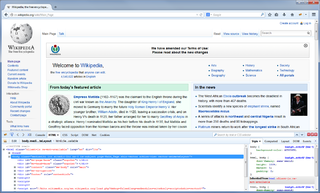| Developer(s) | Philip Chee [1] |
|---|---|
| Initial release | 28 January 2004 |
| Stable release | 1.5.20 (December 6, 2015 [2] ) [±] |
| Preview release | 1.3.21 for Seamonkey [3] / 7 December 2014 |
| Operating system | Cross-platform |
| Available in | 34 languages |
| Type | Firefox extension |
| License | MPL1.1/GPL 2.0/LGPL 2.1 [4] |
| Website | flashblock.mozdev.org |
Flashblock is a discontinued Flash content-filtering Firefox extension for Mozilla Firefox and SeaMonkey. [5]
Flashblock allows users to prevent page elements, such as HTML object tag browser plug-ins and advertisements, from being displayed. Flashblock neither stops the download of Flash content nor does it prevent its execution completely.
The extension uses XBL and CSS to prevent elements of Silverlight, Macromedia Authorware, Adobe Director and Adobe Flash from being displayed. [6] Flashblock does not prevent the elements from being downloaded. [7]
Flashblock provides a mechanism that allows users to display the blocked elements by clicking on them, or by whitelisting.
Flashblock is based on a bookmarklet by Jesse Ruderman. [6] [8]
In 2006, InformationWeek recommended Flashblock, and described it as one of the most popular Firefox extensions. [9] [10] Lifehacker advocated its use in 2009. [11] It was reviewed by download.com in 2011, [12] by Softpedia, [13] and in 2016 Tomsguide.com included it in its "40 Best Firefox Browser Add-Ons". [14]

ChatZilla is an IRC client that is part of SeaMonkey. It was previously an extension for Mozilla-based browsers such as Firefox, introduced in 2000. It is cross-platform open source software which has been noted for its consistent appearance across platforms, CSS appearance customization and scripting.
XUL, which stands for XML User Interface Language, is a user interface markup language developed by Mozilla. XUL is an XML dialect for writing graphical user interfaces, enabling developers to write user interface elements in a manner similar to web pages.

Mozilla Firefox is a free and open source web browser developed by the Mozilla Foundation and its subsidiary, the Mozilla Corporation. It uses the Gecko rendering engine to display web pages, which implements current and anticipated web standards. Firefox is available for Windows 10 and later versions of Windows, macOS, and Linux. Its unofficial ports are available for various Unix and Unix-like operating systems, including FreeBSD, OpenBSD, NetBSD, and other operating systems, such as reactOS. Firefox is also available for Android and iOS. However, as with all other iOS web browsers, the iOS version uses the WebKit layout engine instead of Gecko due to platform requirements. An optimized version is also available on the Amazon Fire TV as one of the two main browsers available with Amazon's Silk Browser.
XBL is an XML-based markup language for altering the behavior of XUL widgets. It was devised at Netscape in the late 1990s as an extension of XUL.
This is a comparison of both historical and current web browsers based on developer, engine, platform(s), releases, license, and cost.
Ghostzilla is a discontinued open source web browser for Microsoft Windows based on Mozilla Application Suite 1.0.1. It ran the browser inside the window space of another application, where the page was then made to look like the content in an email. When moving the cursor out of the window, the browser subsequently disappeared.
FlashGot was an add-on for Firefox that allowed interoperability between the Firefox browser and external download managers. It is no longer compatible with later versions of Firefox. It is not itself a download manager but is designed to allow the Firefox interface to be extended to connect to the selected external download manager. This avoided launching the download manager as an independent application and cutting and pasting the across the links of the files that need to be downloaded. Forked browsers like Pale Moon and Waterfox are also supported.
Add-on is the Mozilla term for software modules that can be added to the Firefox web browser and related applications. Mozilla hosts them on its official add-on website.
NoScript is a free and open-source extension for Firefox- and Chromium-based web browsers, written and maintained by Giorgio Maone, a software developer and member of the Mozilla Security Group.
A browser extension is a software module for customizing a web browser. Browsers typically allow users to install a variety of extensions, including user interface modifications, cookie management, ad blocking, and the custom scripting and styling of web pages.

Mozilla Firefox 3.0 is a version of the Firefox web browser released on June 17, 2008, by the Mozilla Corporation.

DownThemAll! (DTA) is a free and open source download manager browser extension. DTA can download all or some linked files, images, or embedded objects associated with a web page. It can pause, resume, or restart downloads.

Stylish is a user style manager that can change the appearance of web pages in a user's browser without changing their content by including user-supplied CSS style sheets with those supplied by the web site itself. The Stylish browser extension includes tools with which to write user styles, and can install user styles written by other Stylish users from a companion website. These user styles may be more or less selective, targeting just one web page, or all of the pages on a domain, or every page on the web.

Firebug is a discontinued free and open-source web browser extension for Mozilla Firefox that facilitated the live debugging, editing, and monitoring of any website's CSS, HTML, DOM, XHR, and JavaScript.

Mozilla Firefox 2 is a version of Firefox, a web browser released on October 24, 2006 by the Mozilla Corporation.
Web Slices are a web feed technology based on the hAtom Microformat that allows users to subscribe to portions of a web page. Microsoft developed the Web Slice format, and published a specification under their Open Specification Promise. The specification is not published by any independent standards body. Introduced in Internet Explorer 8 Beta 1, Web Slices can be previewed in a fly-out window. As of 2012, Internet Explorer 8 and 9 were the only browsers to support Web Slices natively, although Mozilla Firefox had support via an add-on called webchunks.
The Mozilla Archive Format (MAFF) is a legacy Web archive file format that was provided by Firefox through an extension, used to store one or more web pages with their associated audio, video, and other related web resources to a single file. Unlike MHTML, which uses MIME encoding within a single HTML file, MAFF compresses the page into a Zip container file.
Firefox was created by Dave Hyatt and Blake Ross as an experimental branch of the Mozilla browser, first released as Firefox 1.0 on November 9, 2004. Starting with version 5.0, a rapid release cycle was put into effect, resulting in a new major version release every six weeks. This was gradually accelerated further in late 2019, so that new major releases occur on four-week cycles starting in 2020.

Decentraleyes is a free and open-source browser extension used for local content delivery network (CDN) emulation. Its primary task is to block connections to major CDNs such as Cloudflare and Google and serve popular web libraries locally on the user's machine. Decentraleyes is available for Microsoft Edge, Mozilla Firefox + Firefox ESR, Google Chrome, Pale Moon and Opera web browsers.